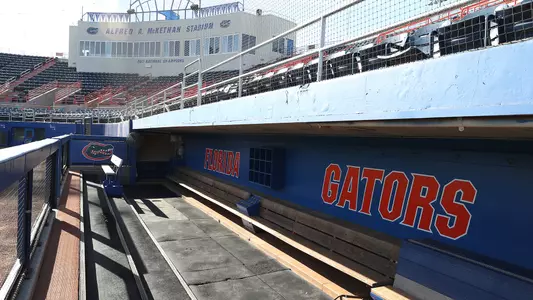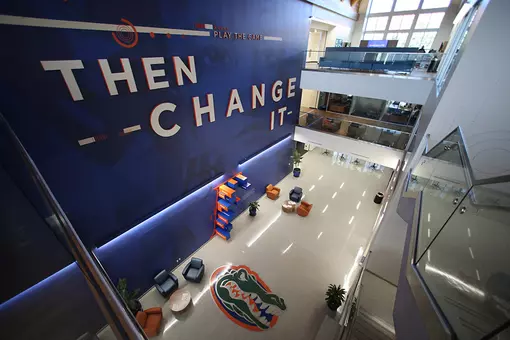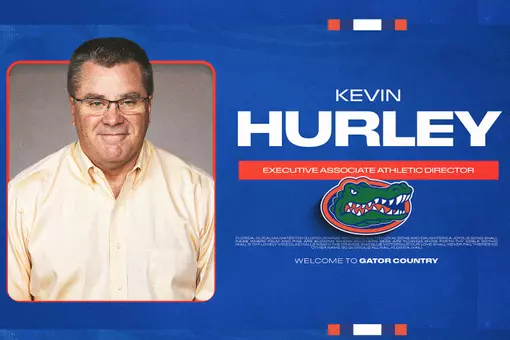
Florida's dugout and McKethan Stadium were empty Friday evening on a night the No. 1-ranked Gators were scheduled to open Southeastern Conference play against Georgia. (Photo: Tim Casey/UAA Communications)
Stricklin, Gators Adjust to New Reality in Unprecedented Week
Friday, March 13, 2020 | General, Scott Carter
GAINESVILLE, Fla. – His week began dripping with anticipation as the Gators men's basketball team headed to Nashville for the Southeastern Conference Tournament. It ended late Friday afternoon with Scott Stricklin, eyes locked on his iPhone to monitor the latest developments, exiting the press box at Ben Hill Griffin Stadium following a press conference he never expected to hold.
As the coronavirus pandemic altered America's way of life over the past 72 hours, Stricklin spearheaded the efforts of what that would mean for the University of Florida's athletic department.
"It's been a crazy week and we're obviously in unique and challenging times,'' Stricklin told a captive audience spread out in stadium seats earlier Friday. "It's directly impacting what we do on a daily basis. I know this is unusual for all of you. This is not a time to worry about competition. The only competition to worry about is to beat this thing and to take the steps necessary."
That was Stricklin's message to Mike White, Dan Mullen, Mary Wise and the rest of Florida's head coaches gathered late Friday morning. Stricklin met with the coaches in anticipation of the SEC's announcement later in the day that the league was suspending all athletic activities through at least April 15.
Just another surreal moment in a surreal week.
After arriving in Nashville on Tuesday afternoon for a series of scheduled meetings on Wednesday morning with SEC athletic directors and school presidents to discuss the "name, image and likeness" concept in college athletics, Stricklin soon realized the week was not going to go as expected.
Not even close.
"Things had started to evolve on campuses,'' Stricklin said. "We were about 10 minutes into the presentation and Commissioner [Greg] Sankey said, 'stop, let's take a break.' Because we were all on our phones communicating back to campus about the things happening."
In an unprecedent day for American sports – or more precisely, America itself – college conferences, professional leagues, school districts and private organizations began to make public announcements regarding changes in day-to-day operations due to coronavirus (COVID-19). In the SEC, initially that was to continue the SEC Tournament following Wednesday night's opening-round games by playing in an empty arena in front of only essential personnel and limited family members of participants.
By the end of a University Athletic Association staff dinner on Wednesday night, Stricklin sensed those plans would likely change. The news out of Oklahoma City, where former Gators head coach Billy Donovan is in his fifth season as head coach of the NBA's Oklahoma City Thunder, was that the game between the Thunder and Utah Jazz had been stopped due to coronavirus concerns.
When Jazz player Rudy Gobert was taken to a local hospital and tested positive for coronavirus, the NBA announced that the league had suspended the season immediately. Gobert and members of the Thunder and Jazz, including Donovan, are now quarantined for two weeks to avoid the potential spread of the virus.
On Thursday morning as he prepared for more SEC meetings in Nashville, Stricklin received a text from Gators women's tennis coach Roland Thornqvist, who had a question.
The Gators were about to travel to Athens for a match against the University of Georgia.
"Hey, what happens if we get up there and one of our kids test positive and we have to leave them up there for two weeks?" Thornqvist texted.
"That was another one of those moments that kind of made me think,'' Stricklin said.
Others at the meetings voiced related concerns and by late Thursday morning, the SEC announced the men's basketball tournament was cancelled and that all conference athletic events were suspended through March 30.
At that point Stricklin began to prepare for a return flight home with fellow UAA senior administrators. Shortly after landing back in Gainesville on Thursday afternoon, Stricklin learned that the NCAA announced the cancellation of March Madness and the rest of the winter and spring sports seasons, including the College World Series.
The landscape changed by the hour as other major professional leagues announced similar moves.
"What now?" Stricklin thought as he drove from the airport. "The thing just continued to deteriorate."
Stricklin arrived at his office Friday morning with a full slate of meetings on the schedule. Meanwhile, the league office worked to finalize plans on extending the suspension of athletic activities in the wake of a coronavirus pandemic, which included a state of emergency being declared by U.S. President Donald Trump on Friday afternoon as Stricklin prepped for his press conference.
He informed the coaches of the league's update and of a dead period in recruiting in all sports until at least April 15. Some sat quietly and took notes. Others asked questions to get a better grasp of the new reality. Stricklin later held a conference call with UAA employees to discuss how the COVID-19 would impact day-to-day operations at one of the country's most successful programs.
In his fourth season as Florida's athletic director and during a career in college athletics that spans more than 25 years, Stricklin has seen a lot. He told reporters that in reviewing his calendar, he attended his first on-campus meeting about coronavirus on Feb. 6.
Still, no one has seen anything like the past three days.
"There's no manual for any of this,'' Stricklin said.
The disappointment on the faces of the coaches spoke to that fact.
"You are looking out and you saw some real hurt in coaches' eyes gearing up for the part of their season that's really special,'' Stricklin said. "I think they are still stinging from that. We're going to put ourselves in a situation to get back to normal as soon as possible. But to do that we all have to make really smart decisions and take care of each other and take care of ourselves.
"We have put April 15th out as a date to work toward. My sense is that's probably optimistic. I'm not an expert, but what we've been told her on campus we probably need to expect that potentially to go longer, and we'll just have to be prepared for that. The most important thing is we, as a society and community and a university, take the steps necessary to protect our young people, protect our staff and our coaches, and protect our fans who love watching our young people compete."
For now, the competition has stopped in hopes of stopping the opponent known as coronavirus.
As the coronavirus pandemic altered America's way of life over the past 72 hours, Stricklin spearheaded the efforts of what that would mean for the University of Florida's athletic department.
"It's been a crazy week and we're obviously in unique and challenging times,'' Stricklin told a captive audience spread out in stadium seats earlier Friday. "It's directly impacting what we do on a daily basis. I know this is unusual for all of you. This is not a time to worry about competition. The only competition to worry about is to beat this thing and to take the steps necessary."
That was Stricklin's message to Mike White, Dan Mullen, Mary Wise and the rest of Florida's head coaches gathered late Friday morning. Stricklin met with the coaches in anticipation of the SEC's announcement later in the day that the league was suspending all athletic activities through at least April 15.
Just another surreal moment in a surreal week.
After arriving in Nashville on Tuesday afternoon for a series of scheduled meetings on Wednesday morning with SEC athletic directors and school presidents to discuss the "name, image and likeness" concept in college athletics, Stricklin soon realized the week was not going to go as expected.
Not even close.
"Things had started to evolve on campuses,'' Stricklin said. "We were about 10 minutes into the presentation and Commissioner [Greg] Sankey said, 'stop, let's take a break.' Because we were all on our phones communicating back to campus about the things happening."
In an unprecedent day for American sports – or more precisely, America itself – college conferences, professional leagues, school districts and private organizations began to make public announcements regarding changes in day-to-day operations due to coronavirus (COVID-19). In the SEC, initially that was to continue the SEC Tournament following Wednesday night's opening-round games by playing in an empty arena in front of only essential personnel and limited family members of participants.
By the end of a University Athletic Association staff dinner on Wednesday night, Stricklin sensed those plans would likely change. The news out of Oklahoma City, where former Gators head coach Billy Donovan is in his fifth season as head coach of the NBA's Oklahoma City Thunder, was that the game between the Thunder and Utah Jazz had been stopped due to coronavirus concerns.
When Jazz player Rudy Gobert was taken to a local hospital and tested positive for coronavirus, the NBA announced that the league had suspended the season immediately. Gobert and members of the Thunder and Jazz, including Donovan, are now quarantined for two weeks to avoid the potential spread of the virus.
On Thursday morning as he prepared for more SEC meetings in Nashville, Stricklin received a text from Gators women's tennis coach Roland Thornqvist, who had a question.
The Gators were about to travel to Athens for a match against the University of Georgia.
"Hey, what happens if we get up there and one of our kids test positive and we have to leave them up there for two weeks?" Thornqvist texted.
"That was another one of those moments that kind of made me think,'' Stricklin said.
Others at the meetings voiced related concerns and by late Thursday morning, the SEC announced the men's basketball tournament was cancelled and that all conference athletic events were suspended through March 30.
At that point Stricklin began to prepare for a return flight home with fellow UAA senior administrators. Shortly after landing back in Gainesville on Thursday afternoon, Stricklin learned that the NCAA announced the cancellation of March Madness and the rest of the winter and spring sports seasons, including the College World Series.
The landscape changed by the hour as other major professional leagues announced similar moves.
"What now?" Stricklin thought as he drove from the airport. "The thing just continued to deteriorate."
Stricklin arrived at his office Friday morning with a full slate of meetings on the schedule. Meanwhile, the league office worked to finalize plans on extending the suspension of athletic activities in the wake of a coronavirus pandemic, which included a state of emergency being declared by U.S. President Donald Trump on Friday afternoon as Stricklin prepped for his press conference.
He informed the coaches of the league's update and of a dead period in recruiting in all sports until at least April 15. Some sat quietly and took notes. Others asked questions to get a better grasp of the new reality. Stricklin later held a conference call with UAA employees to discuss how the COVID-19 would impact day-to-day operations at one of the country's most successful programs.
In his fourth season as Florida's athletic director and during a career in college athletics that spans more than 25 years, Stricklin has seen a lot. He told reporters that in reviewing his calendar, he attended his first on-campus meeting about coronavirus on Feb. 6.
Still, no one has seen anything like the past three days.
"There's no manual for any of this,'' Stricklin said.
The disappointment on the faces of the coaches spoke to that fact.
"You are looking out and you saw some real hurt in coaches' eyes gearing up for the part of their season that's really special,'' Stricklin said. "I think they are still stinging from that. We're going to put ourselves in a situation to get back to normal as soon as possible. But to do that we all have to make really smart decisions and take care of each other and take care of ourselves.
"We have put April 15th out as a date to work toward. My sense is that's probably optimistic. I'm not an expert, but what we've been told her on campus we probably need to expect that potentially to go longer, and we'll just have to be prepared for that. The most important thing is we, as a society and community and a university, take the steps necessary to protect our young people, protect our staff and our coaches, and protect our fans who love watching our young people compete."
For now, the competition has stopped in hopes of stopping the opponent known as coronavirus.
Head Coach Kelly Rae Finley Postgame Press Conference 02-22-26
Sunday, February 22
Florida Men's Basketball | Postgame Press Conference | Ole Miss
Sunday, February 22
Florida Men's Basketball Highlights | Ole Miss 2-21-26
Sunday, February 22
Gator Insider presented by Talon Wealth 2-21-26
Saturday, February 21






